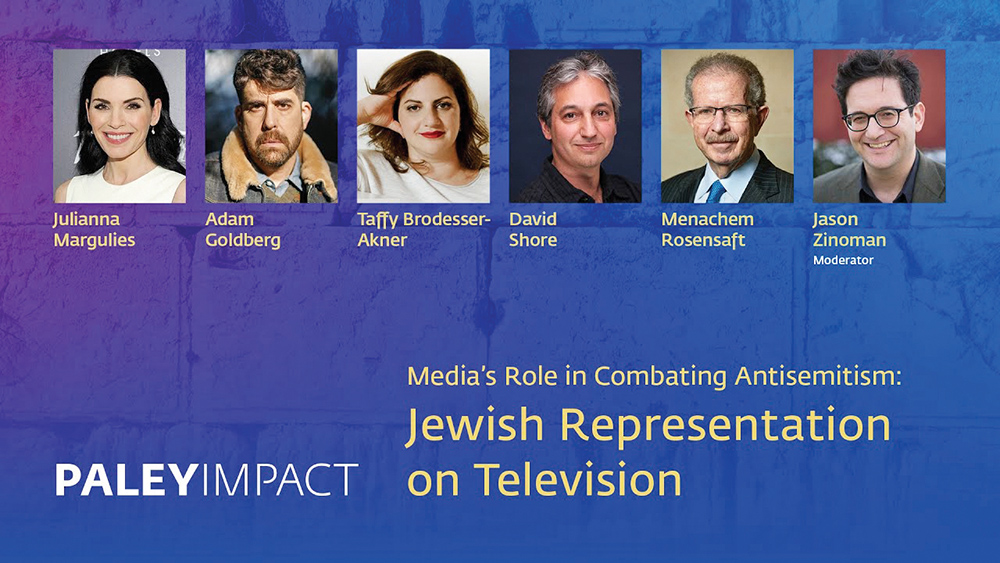
In an effort to mitigate rising antisemitism in America, The Paley Center for Media (Paley) hosted “Media’s Role in Combating Antisemitism: Jewish Representation on Television” on June 15, featuring a panel of creators, actors and cultural leaders to discuss the situation. The discussion was moderated by Jason Zinoman, a critic at large for The New York Times, and featured actress Julianna Margulies, actor Adam Goldberg, television creators Taffy Brodesser-Akner and David Shore, and General Counsel and Associate Executive Vice President of the World Jewish Congress Menachem Rosensaft. As part of a series called “PaleyImpact,” the organization will be hosting similar events quarterly to educate, inform and raise awareness about this rising crisis.
I went with my friend David Herman to the event and learned a lot about how the media affects antisemitism, ways of being mindful of the issue, and approaches to stopping it.
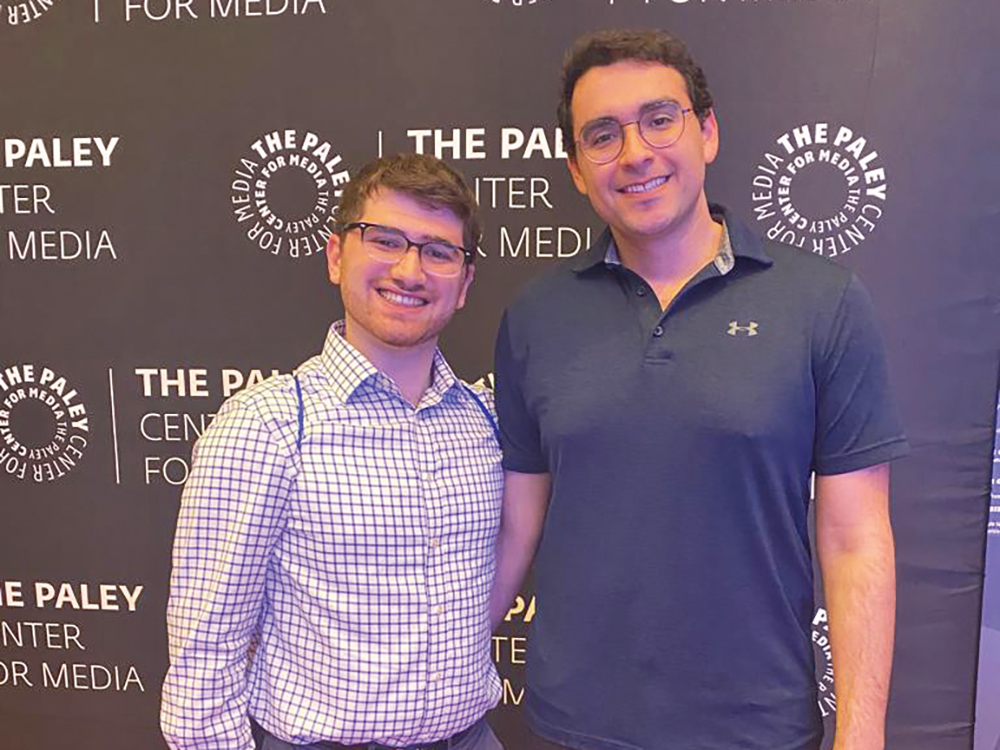
David and I arrived early to attend the red carpet segment of the event, which was held on the top floor of the Paley Center, situated at street level. The building’s facade was impressive, being made out of white limestone bricks. It reminded me of something I would see in ancient Greece. Above the glass revolving door at the entrance is an arch with a pediment displaying the Paley Center logo and bricks that stick out in a pattern, looking like rays from the sun. Inside the building, there is a red carpet; set up behind it was a wide step and a repeat backdrop with Paley’s logo. All over the walls are photographs of famous actors such as Robin Williams, Matthew Perry and Bob Odenkirk.
As the panelists arrived, they posed for photos in front of the backdrop. Aliana Kann Michals, who works in public relations for Paley, asked Goldberg, “What do you love most about Paley?” The actor replied, “It offers incredible opportunities to delve into interesting discussions about media.” He wasn’t able to expound upon his answer because he was quickly ushered away by the staff to prepare for the event.
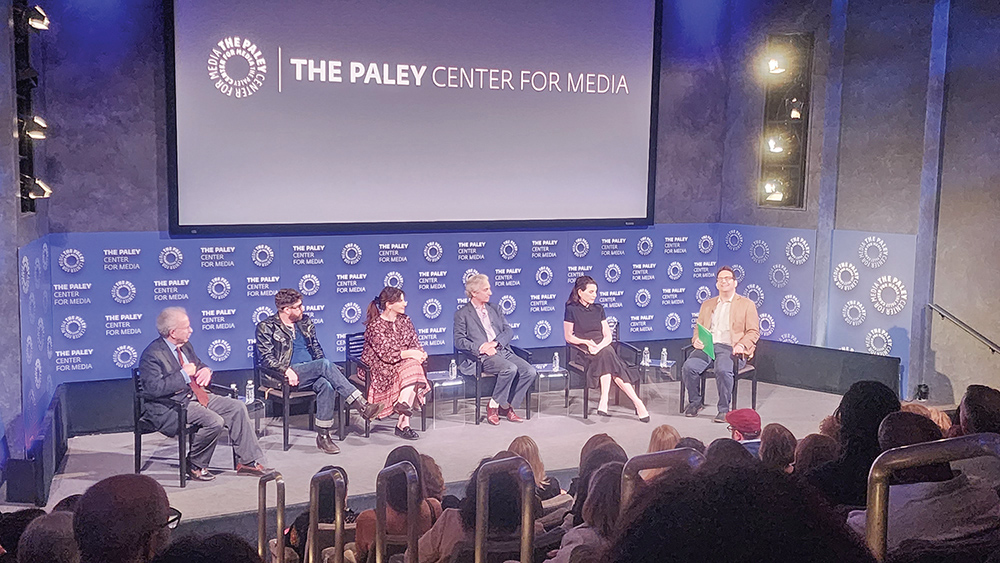
Following the red carpet segment, David and I rode down the elevator to the screening theater. The theater has very comfortable plush gray seats and a huge screen. Additionally, there is a center stage with overhead stage lighting. Onto the walls, lights projected Paley’s logo throughout the theater. The theater holds roughly 200 seats and was completely packed for this sold-out event.
A brief video about Paley kicked off the event. The video showed celebrities who had visited in the past, and encouraged viewers to become members to gain access to daily events. Paley CEO Maureen J. Reidy then stepped onto the stage and spoke about the recent rise of antisemitism and how she felt that media can be a great way to combat it by showcasing Jews in a positive light.
A video then showed clips of Jews in the media over the years, including scenes with those on the panel such as “Fleishman Is in Trouble” author and creator Taffy Brodesser-Akner and CBS’s “The Equalizer” actor Goldberg. Zinoman, the moderator, began the panel by asking if any of the participants had noticed a change in the conversation and narrative around Jews recently. Goldberg, outspoken on social media, shared that he has seen a rise over the years. Growing up, he perceived antisemitism as a historical phenomenon. However, in recent years, he has faced online bullying and encountered antisemitic content such as Holocaust jokes intended to offend him.
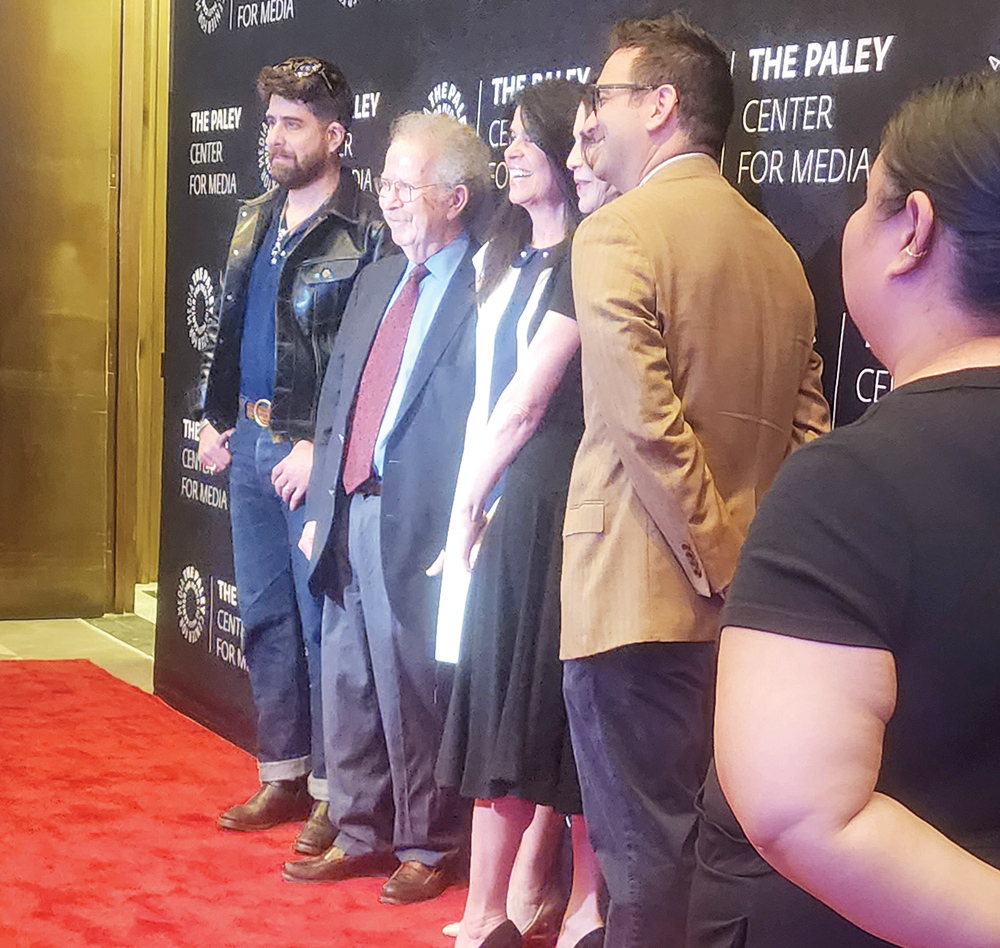
The panelists discussed the potential role of television in combating stereotypes. Rosensaft emphasized the importance of portraying positive Jewish characters and breaking away from clichés. Often, Jewish characters are only portrayed with superficial Jewish traits, such as having a grandparent who experienced the Holocaust or having a bat mitzvah. He proposed showcasing modern, everyday Jews whose religion is an essential part of who they are and adds depth to their character, not just an afterthought.
Rosensaft referenced a character on the iconic television show “L.A. Law” (1986-1994) who was half-Jewish and half-Catholic, but whose Judaism was never mentioned or explored. Shore humorously admitted, “I worked on that show and didn’t even know that he was Jewish.” Everyone in the audience burst out laughing because Rosensaft’s point had been so perfectly illustrated. Providing context, Shore added that Hollywood used to be afraid of showing too much Jewish content. They wanted to show that there are Jews, but not go in deeply. That was the opposite of how he felt the media acts today, where they go above and beyond to showcase many different cultures.
Brodesser-Akner noted that shows like “Little House on the Prairie” (1974-1983) included Jewish traditions, such as not mixing milk and meat, and suggested that there is a need for more authentic representations of Jews. She also mentioned her appreciation for the 2022 television show “The Patient,”, which depicted a Jewish couple who was less observant struggling to maintain a relationship with their observant child who wouldn’t eat at their house due to kashrut issues. Margulies shared an instance from her own show where her character wore a cross, and she regretted not advocating for the inclusion of a Star of David to represent Jewish normalcy. Shore added that the goal of representation on television is to consistently show different types of people, regardless of race, religion or disability..
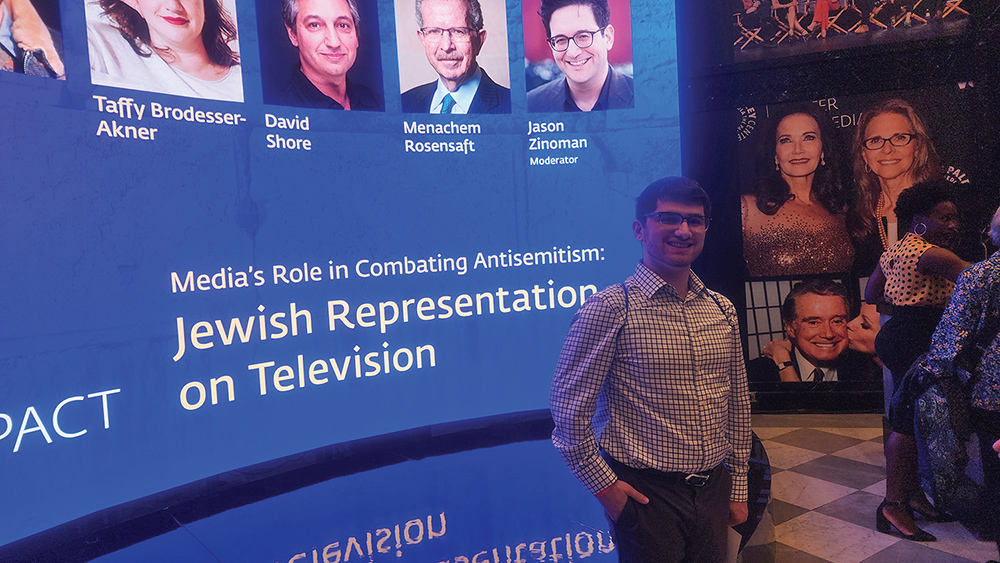
Zinoman asked the panel how important it is for Jewish characters to be played by Jewish actors. Brodesser-Akner said it is important for creators to understand what type of casting they are going for. In “real casting,” where the goal is to get the most accurate portrayal of a character, a Jewish person should ideally play a Jewish character. However, in “dream casting,” where the goal is to cast a famous celebrity, the background of the actor doesn’t matter as much. Shore added that he was the only Jew in his high school, and everyone knew it; therefore, portraying Jews accurately is essential, because people do notice. However, Margulies felt that if the actor does their due diligence in studying a culture, it doesn’t matter if the cast type is correct. As an example, she explained that someone who is single should be allowed to play someone married.
The event closed with an open-mic Q&A with the audience. One question I found particularly interesting was about the moral implications of portraying Jewish characters as villains, and whether or not this limits creativity. Brodesser-Akner deflected by saying that there is little that can be done when non-Jews resent Jews being designated “the chosen people.” Rosensaft said he doesn’t have a problem with Jewish villains in cases like Bernie Madoff and Jeffrey Epstein, but cautioned against perpetuating negative stereotypes, such as portraying Jews as money-grubbing. He highlighted the need for television to responsibly address and dismantle these tropes, as they can have a significant impact in minority areas outside of big cities. Goldberg warned that oftentimes as Jews, we are made to feel ashamed of complaining against antisemitic remarks like “Jews control the media,” and that by not complaining, we begin to buy into them.
Overall, I really appreciated being able to attend this discussion because it made me more aware of the rising antisemitism and how the media can help in combating it. It was an interesting, open and honest conversation among impressive individuals across different backgrounds. One crucial takeaway for me was the importance of countering negative stereotypes and misconceptions about Jews by embodying values of kindness, empathy and respect. As we strive for a more-inclusive society, it is incumbent upon us as Jews to actively contribute to positive change by fostering compassion and promoting dialogue across communities.
By becoming a member of the Paley Center for Media, you’ll gain exclusive access to a range of events, including conversations with top media personalities in “PaleyLive!,” the renowned PaleyFest celebrating television, and the PaleyDoc festival highlighting documentaries. The center offers daily screenings, often accompanied by original props and memorabilia from the show.
Be on the lookout for the next installment of “Media’s Role in Combating Antisemitism.”
Address: 25 West 52nd Street, New York, NY 10019
Hours: Center is closed on Mondays and Thursday; generally opened 12-6 p.m. with special events running later.
Phone: (212) 621-6600
Link to become a member and get access to daily screenings: https://bit.ly/3MLcRDG
Cost per day: $21.50 per person, $17.50 for students, teachers, and seniors; Paley GX VR extra $11
Cost to be a member: $75 per person, $50 for students, teachers, and seniors
Unique Feature of Paley: See celebrity guests at exciting and interesting events
Zachary Greenberg is a consultant at Semler Brossy and the TABC track coach. In 2016, Zack sang the “Pizza Man Song” at Camp Mesorah as a counselor for Yachad. Additionally, Zack recently watched the film “Indiana Jones and the Dial of Destiny” at an early theatrical screening. If you have any recommendations of fun places for Zack to cover, email him at [email protected]. For more content, follow Zack @FunZacktivities on Instagram.









